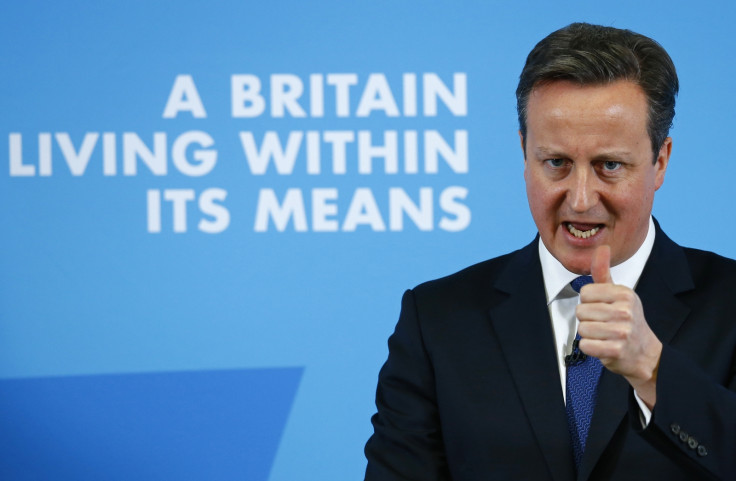David Cameron preying on our fears after Charlie Hebdo massacre with encryption ban calls
Cameron promising draconian surveillance measures if he wins election

On Monday 12 January, David Cameron posed this question:
In our country, do we want to allow a means of communication between people which, even in extremis with a signed warrant from the Home Secretary, that we cannot read?"
His answer, in case anyone was in any doubt, was: "No, we must not."
Not only is Cameron's proposal an ill-thought-out piece of electioneering, what is worse is that it is a danger to British citizens and an affront to the memory of the 17 people killed in the Charlie Hebdo massacre in Paris last week.
Cameron's pledge to the British public on Monday was that if he wins next May's general election, he will introduce a "comprehensive piece of legislation" to shut down the "safe spaces" he believes suspected terrorists use to talk to each other online.
The "safe spaces" Cameron mysteriously referred to are in fact messaging apps used by tens of millions of ordinary citizens across the UK.
There's no back door that only lets good guys go through it
WhatsApp and Snapchat both use end-to-end encryption as does Apple's iMessage and FaceTime services. As a side-note this type of encryption is also in use by critical services like online banking, but of course Cameron didn't have time to say how his "comprehensive legislation" would address this major technical challenge.
Backdoors
Cameron is essentially calling on companies like WhatsApp and Apple to install backdoors in their systems to allow the UK authorities access them whenever they want.
Not only is this a huge invasion of people's privacy, it will also mean that such services will now be much more vulnerable to attack from everyone from cyber-criminals to hacktivists.
As Cory Doctorow points out:
There's no back door that only lets good guys go through it. If your WhatsApp or Google Hangouts has a deliberately introduced flaw in it, then foreign spies, criminals, crooked police and criminals will eventually discover this vulnerability. They – and not just the security services – will be able to use it to intercept all of our communications. That includes things like the pictures of your kids in your bath that you send to your parents to the trade secrets you send to your co-workers.
The move could also see companies like Apple simply pack their bags and leave the UK entirely. Apple CEO Tim Cook specifically addressed this issue last year:
I want to be absolutely clear that we have never worked with any government agency from any country to create a backdoor in any of our products or services. We have also never allowed access to our servers. And we never will.
So not only is Cameron promising to violate our privacy and open all citizens up to attack, but he is potentially going to alienate some of the world's biggest tech companies who may decide it's not worth the hassle and leave the country entirely.
Preying on our fears
Cameron was speaking in the wake of the massacre of 17 people in Paris last week when two gunmen attacked the satirical magazine Charlie Hebdo for publishing cartoons of the prophet Mohammed.
The British Prime Minister had just returned from taking centre stage at a march in the French capital on Sunday along with dozens of other world leaders who were showing their solidarity with the French people in the wake of last week's tragic events.
And while Cameron will say he only has the interests and safety of the British public in mind, what he is really thinking about is the up-coming election in May.
In the wake of the Charlie Hebdo massacre, tensions in the UK have ratcheted up once again as it's feared a similar attack may happen here - and Cameron is preying on those fears to try and push through draconian legislation which make George Orwell's 1984 look positively utopian.
Cameron is seeking to play the role of protector by promising the UK public that granting these powers will help fight the growing terror threat.
The problem is that time and again we have seen this is simply not true.
More information does't mean better information
Just over 13 years ago we heard a similar cry from the US government following the attack on the Twin Towers. The result was Prism, the NSA's mass electronic surveillance programme which Edward Snowden laid bare in a series of high profile leaks, revealing what was seen by many as a huge invasion of privacy.
This led to an unprecedented level of data collection, including details about Chechen brothers Dzhokhar and Tamerlan Tsarnaev. Yet despite having all the information, the NSA was unable to prevent the brothers carrying out the Boston Marathon bombings in 2013.
In the UK, GCHQ was made aware of Michael Adebolajo five years before he and Michael Adebowale carried out the horrific murder of fusilier Lee Rigby.
Despite knowing of Adebolajo's arrest in Kenya in 2010 and him willingness to fight alongside Somali militant group al-Shabab, GCHQ could not prevent the senseless attack.
The gunmen who carried out the Charlie Hebdo massacres - Cherif and Said Kouachi - were known to the French authorities as potential terrorist suspects yet, as we all know, they we were unable to prevent this tragedy.
As the Electronic Frontier Foundation says what Cameron is trying to do should simply not be accepted:
Let us resist attempts to use this tragic moment as an opportunity to advance law enforcement surveillance powers. Freedom of speech can only thrive when we also have the right to privacy.
© Copyright IBTimes 2025. All rights reserved.





















